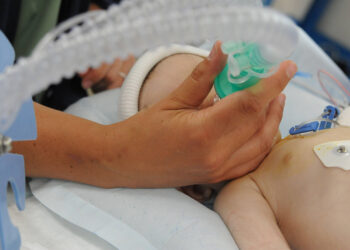Medical school is a fast-paced, high-pressure environment where students are expected to excel. As part of their training, they learn to navigate tense interactions with faculty, residents, peers, and patients. But what happens when those interactions cross a line and students feel harassed, mistreated, or humiliated?
Nearly 40% of medical students reported experiencing harassment during med school, according to the Association of American Medical Colleges’ (AAMC’s) most recent survey of 2023-2024 graduates.
The behaviors include being publicly humiliated or subjected to sexist, racist, or ethnically offensive remarks or names. In addition, almost 40% of graduates reported being publicly embarrassed. Clinical rotation faculty were cited as perpetrators of most of the negative behaviors in the survey.
As the AAMC questionnaire shows, mistreatment continues to take place in medical schools despite policies that seek to curb it.
Caroline Beit was 4 months pregnant when she entered the Johns Hopkins School of Medicine, Baltimore, in the fall of 2024. From her first day until she gave birth to her daughter earlier this year, she claims she was verbally harassed by faculty and students about her choice to have a baby while attending medical school.
She said that one professor told her class that pregnancy was a “truly horrible disease.” Another initially referred to pregnancy as a “disease state” before telling the class that their classmate could tell them all about pregnancy. “The attention on my pregnancy from the entire class embarrassed me,” Beit told Medscape Medical News.
In addition, Beit said she felt harassed by students, who asked if they could watch the birth. They commented on her changing body, inquired whether it was a planned pregnancy, and even suggested she have an abortion. She also said that fellow students told her that she should take an exam elsewhere in case she went into labor and distracted them.
In response to Medscape Medical News’ inquiries about the complaint, a Johns Hopkins University spokesperson said that the school protects student privacy under federal law and could not comment on individual cases or complaints.
“We have long-established policies in place that strictly prohibit discrimination and harassment,” read an emailed statement from a university spokesperson. “We take all reports seriously and evaluate each one to take appropriate action. If any member of our community experiences or witnesses such behavior, we encourage them to contact the Office of Institutional Equity [OIE],” the statement read.
“The School of Medicine has additional resources to respond to student concerns and address a wide range of potential issues, and we are continually working to ensure that all of our students are treated with fairness and respect.”
About Medscape Data
Medscape continually surveys physicians and other medical professionals about key practice challenges and current issues, creating high-impact analyses.
For example, a soon-to-be-published report on medical school stressors found that
- One quarter of fourth-year med students have been harassed or bullied by attendings or residents.
- 19% of med students reported bullying by fellow students.
In addition, nearly 30% of students reported unwanted advances from patients, followed by such advances from peers. Among female students, the rate of unwanted advances from patients, 38%, was slightly higher, according to another Medscape report.
Filing a Complaint
Nathalie Feldman, MD, director of the Learning Environment at The Robert Larner, MD, College of Medicine at the University of Vermont (UVM), Burlington, Vermont, encourages students who believe they’ve been mistreated to file a report. She said that the bar is very low for reporting at their institution, so they will address anything that makes students feel uncomfortable.
She also added that students have a QR barcode on the back of their name badges connecting them with forms to report concerns or unprofessional behavior. “We try to decrease as many barriers to reporting as possible,” said Feldman, an associate professor in the medical school’s Department of Obstetrics, Gynecology, and Reproductive Sciences.
Beit said that she filed informal complaints with Johns Hopkins’ Office of Medical Student Affairs and formal complaints with the Mistreatment Incident and Learning Environment Surveillance (MILES) Committee, which promotes a safe and respectful learning environment for medical students. MILES must notify and file a complaint with the OIE, which oversees compliance with antidiscrimination and harassment policies. Beit added that MILES also changed her to a different professor’s group.
In response to the complaints, one professor sent a written apology to her group that he had erred and that “it was wrong to classify pregnancy as a disease.”
She doesn’t believe the other complaint was resolved, nor that her complaints led to any significant institutional changes. She didn’t file complaints against her fellow students.
Why Misbehavior Occurs in Med School
Beit is not alone in her claims of mistreatment in medical school.
Among the findings of the AAMC’s 2024 graduation questionnaire, about 20% of students reported being publicly humiliated, 13% subjected to offensive sexual remarks or names, and nearly 9% experiencing racially or ethnically offensive comments.
The statistics have improved slightly since 2020, with more students knowing how to report mistreatment at their schools and reporting it, according to the survey.
While most medical educators and staff are “professional and well-meaning,” some abuse their power, said Tim Lacy, senior director of Student Learning Environment at the University of Illinois College of Medicine, Chicago. “Some people with poor intentions are opportunistic, taking advantage of sincere or naïve medical students.”
Feldman believes that some contributing factors to mistreatment, harassment, or public humiliation of medical students might relate to the hierarchal system of teaching hospitals and to generational differences in communication styles between students and faculty or other supervising clinicians that can cause tension, especially in the “high-stakes, high-acuity” environment of patient care.
Feldman added that often the harassing or bullying behavior isn’t intentional but rather committed by individuals who were taught with those same public humiliation techniques and may be unfamiliar with how language and training have evolved.
Halting Harassment
The Liaison Committee on Medical Education (LCME), an accrediting body for educational programs at schools of medicine, requires medical schools to set standards for student mistreatment, among other qualifications for accreditation. Medical schools are expected to develop written policies that define mistreatment, have mechanisms in place for prompt responses to complaints, and support educational activities that prevent mistreatment, according to the current LCME standards.
The LCME standards include general guidelines for creating respectful learning environments and relationships, but ultimately, schools have flexibility in how they apply the principles, so policies differ by school, said Geoffrey Young, AAMC senior director for the Transforming the Health Care Workforce unit.
For instance, the University of Illinois College of Medicine has a code of professional conduct for teacher-student relationships and standards for reporting student mistreatment in its Positive Learning Environment Policy. Per the policy, “Publicly humiliating, physically harming, exploiting, and/or subjecting an individual to unwanted sexual advances are all examples of mistreatment.”
Schools must also ensure students understand how to report mistreatment and that “any violations can be registered and investigated without fear of retaliation.” Among the reasons graduates do not report such incidents are a belief that the school will not act and fear of reprisal.
“Even though there’s a policy and a reporting process, we still know there’s underreporting because of fear of retribution and retaliation. It’s my job to make sure students feel confident and reassure them by reporting and representing their best interests,” Lacy said.
He advises students that filing a complaint might affect their career options. If they want to proceed, he cautions students to file reports well before grades are released so the complaint doesn’t appear to result from grading. Some students may even delay complaints until after they graduate to avoid repercussions, Lacy said.
Beit admitted that she was afraid of repercussions and still is. “I worry that, given that I have 3 years left, that I will continue to be harassed for having a child while in medical school.”
When a student comes to Lacy with concerns, he clarifies whether they want to consult with him confidentially or report an issue. He told Medscape Medical News that most students want a sounding board. The conversation may occur in person, through video conferencing, or via email. Lacy said he tries to respond to the initial report within a day or two, but a complete institutional response to the situation can vary from a day to several weeks.
Most of the reports of abuse are from third-year medical students, he added. “As the year progresses, they come to realize a range of normal clinical behaviors and begin to be comfortable reporting events outside of that range.”
In some cases, the school can resolve the situation without reporting an incident. Lacy cited a recent student complaint he received through email, prompting him to speak with the education dean and clerkship director to resolve the issue. “I consult with whoever has the power to change the situation.”
Feldman explained that the tiered resolution process at The Robert Larner, MD, College of Medicine at the UVM starts with an informal dialogue and, if necessary, escalates to a formal investigation. Faculty members may be removed from teaching activities until they complete coaching or a remediation program. If that doesn’t prevent recurrence, the incident might be documented in their professional record, leading to other more severe disciplinary actions, such as decreased responsibilities or losing their job. However, Feldman said, “That’s extremely rare, but it’s possible.”
At the University of Colorado School of Medicine, Aurora, Colorado, several policies and processes help protect students from unprofessional behavior, including a Teacher-Learner Agreement and a Mistreatment Policy. The latter refers students who witness such behavior to the Office of Faculty Relations, which can provide support and help them report incidents.
The office directs students whose concerns involve discrimination, sexual misconduct, or harassment to the CU Office of Equity. “We will talk the student through the process and let them know what to expect,” said Abigail Lara, MD, assistant dean for faculty relations.
Resolution procedures run the gamut from potential sanctions against staff who violate the policy — a warning, a written letter of reprimand, or the employee’s firing. Other sanctions may include mandatory training, demotion, change in job responsibilities, reduced salary, ineligibility for merit increases, or denying access to all or a portion of the university’s property.
Protecting Students
Two years ago, the University of Colorado School of Medicine launched an antimistreatment effort that analyzed their students’ reports of negative behaviors on the AAMC graduation questionnaire surveys from 2019 to 2023. The school conducted its own survey at the end of the clinical rotation period and held focus groups with students, Lara added.
She said the campaign decreased experiences of bullying and mistreatment. In addition, if a student reports mistreatment on the survey, it automatically flags an administrator to reach out to the student to see if they want to discuss the issue further.
UVM’s medical school saw a “dramatic decrease” in student mistreatment reports from the operating room (OR) when students were better trained to maintain a sterile field, a concern of OR nurses, Feldman said.
“New students were coming into the operating room, and the nurses would bark at them if they got too close to the table. Students reported it as mistreatment to us. So, we created a shadowing [opportunity] where students could follow a patient care associate to learn how to keep a sterile field,” she said.
“Then we went back to the perioperative staff, the nurses where the mistreatment was coming from, and they said the students were so much better prepared. We involved them in training our students, and they were empowered to then teach them the right way to keep a sterile field.”
Feldman added that involving the students in the resolution process also can help ease tension. They can also refer students to counseling and psychiatry services to help them cope with the aftermath of an incident.
Despite policies and methods for resolving conflicts, Beit believes med schools like hers that value diversity of experiences in their incoming classes should better protect those who don’t fit the mold of the traditional student.
“Policies technically prevent discrimination and harassment. In practice, they are not doing enough to protect students,” she said. She understands the risks she took bringing attention to a perceived injustice. But she didn’t think the school culture would change unless she spoke up.
If medical students feel they’ve been bullied or harassed, Lacy recommends:
- Keep a recurring journal or send an email to yourself with the details of an incident. Take notes while you can remember the conversations and specifics, especially if you’re considering action in the future.
- Document the incident with evidence, such as screenshots of chats, in case they are deleted later.
- If you’re unsure about reporting an incident, find a trusted staff member, faculty member, or student leader to consult.
- Report incidents sooner rather than later so concerns are taken seriously and can be investigated timely.
Roni Robbins is a freelance journalist and former editor for Medscape Business of Medicine. She’s also a freelance health reporter for The Atlanta Journal-Constitution. Her writing has appeared in WebMD, HuffPost, Forbes, New York Daily News, BioPharma Dive, MNN, Adweek, Healthline, and others. She’s also the author of the multiaward-winning Hands of Gold: One Man’s Quest to Find the Silver Lining in Misfortune.
Source link : https://www.medscape.com/viewarticle/harassed-med-school-2025a1000j2l?src=rss
Author :
Publish date : 2025-07-18 08:10:00
Copyright for syndicated content belongs to the linked Source.












